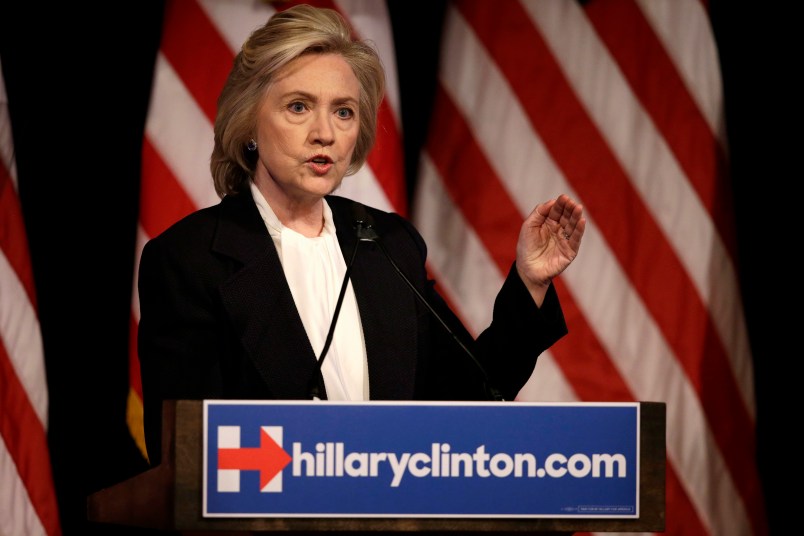MIAMI (AP) — Drawing a sharp distinction with her main Republican rivals in Florida, Hillary Rodham Clinton on Friday called on the GOP-run Congress to end the trade embargo the U.S. has imposed on Cuba since 1962.
The Democratic presidential favorite said an open economic relationship would do more to bring “dignity and democracy” to the island nation than continuing the hardline isolationism that lasted through five decades of Republican and Democratic administrations, including her husband’s two terms.
President Barack Obama has normalized diplomatic relations with Cuba and has called for Congress to lift the economic embargo, as well.
Clinton acknowledged that she previously supported sanctions in Cuba, but she told an auditorium of students, faculty and others at Florida International University that she changed her views during four years as Obama’s secretary of state. During that time, there also has been a softening of public opinion among the million-plus Cuban-Americans who hold considerable sway in Florida voting.
Clinton accused Republican presidential candidates — without calling them by name — of approaching Cuba and Latin America “through a Cold War prism.”
“They have it backwards: Engagement is not a gift to the Castros; it’s a threat to the Castros,” Clinton said. “An American embassy in Havana isn’t a concession; it’s a beacon. Lifting the embargo doesn’t set back freedom; it advances freedom.”
She framed their stance on the embargo as part of broader foreign affairs errors.
She didn’t name any Republican presidential contenders, including Florida Sen. Marco Rubio and former Florida Gov. Jeb Bush, both vocal critics of Obama’s December decision to establish diplomatic relations with Cuba.
But she said, “We cannot afford to let out-of-touch, out-of- date, partisan ideas and candidates rip away all the progress we’ve made.”
Bush, who earlier shared a stage with Clinton at a National Urban League conference in nearby Fort Lauderdale, embraced their disagreement, saying it was “insulting to many residents of Miami for Hillary Clinton to come here to endorse a retreat in the struggle for democracy in Cuba.”
Rubio had pre-emptively criticized Clinton, issuing a statement before her speech. “President Obama and Secretary Clinton must learn that appeasement only emboldens dictators and repressive governments and weakens America’s global standing in the 21st century,” he said.
U.S.-Cuba relations have long been a flashpoint in Florida politics. The generations of Cuban-Americans who were born in Cuba and fled shortly after the Castro-led revolution in the late 1950s generally supported a hard line, including the embargo that keeps American businesses from trading with Cuba and blocks Americans from traveling in the country and spending money there as tourists.
For decades, south Florida politicians and presidential candidates vying for the state’s electoral votes reflected those views, regardless of party. Clinton’s husband was among them, even as he quietly attempted to engage Fidel Castro in the 1990s.
Now, says Florida pollster Fernand Amandi, an expert on Cuban-American public opinion, that once solid voting bloc is “a community in transition,” giving Clinton an opening.
U.S.-born Cuban-Americans, Amandi said, are consistently more supportive of normalized relations than their Cuban-born parents and also are less likely to consider themselves one-issue voters. “The younger generations are more like any other immigrants — they care about pocketbook issues, jobs, their kids’ educations,” he said.
In addition, Cuba-born immigrants in the past few decades “lived under the sanctions and concluded that it just emboldened the Castro regime,” he said. “So think after 55 years of failure, it’s time for something else.”
Beyond the Cuban-American community, a majority of adults in the U.S. support normalizing relations with Cuba. A Pew Research Center survey conducted July 14-20 found that nearly 73 percent of Americans approve of establishing diplomatic relations with Cuba, while 72 percent support ending the trade embargo, both double-digit percentage increases from January, immediately after Obama’s decision.
Pew found the same trends though lower numbers among Republicans, with 56 percent of such voters backing a diplomatic bond and 59 percent supporting an economic relationship.
___
Associated Press writer Lisa Lerer contributed to this report from Washington.
___
Follow Barrow on Twitter at: http://twitter.com/BillBarrowAP
Copyright 2015 The Associated Press. All rights reserved. This material may not be published, broadcast, rewritten or redistributed.







Yup no difference between Hillary and the GOP at all. Both parties are the same too. Yada, yada, yada…
Cut her some slack–it would have taken too long to list them all.
My sister-in-law’s father-in-law was a political prisoner for six years in the 1960s. He’s elderly now, and I have hesitated to ask him about this issue for fear of bringing up a sore subject.
Recently, at a family get-together, he spoke of an experience of his imprisonment and his eventual release. We had the TV on, and there was a commercial for a Rolex watch. He said while in prison he attempted to bribe a government official by giving him his watch. The official agreed to help him escape, but nothing ever came of it. The man was eventually released, went to Puerto Rico to reunite with his family, and they eventually moved to New York and then Miami.
He added that he met his old jailer on a Miami street and confronted him about the Rolex. The man recognized him, and handed the watch over to him.
I turned to his wife and asked her her views on this. She was emphatic in her support of opening relations. She said the old policy was a failure, it has been a long time, we all needed to move on, and the embargo has only hurt the Cuban people.